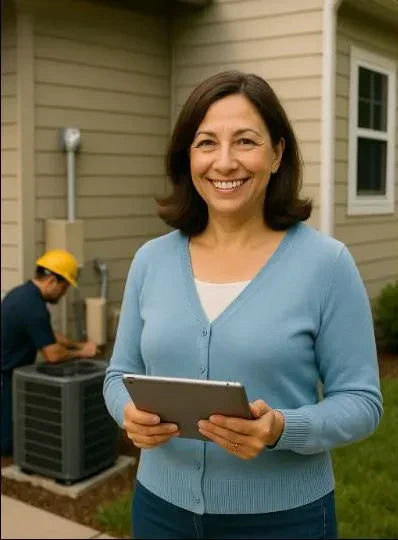Troubleshooting Common Issues in AC + Air Handler Systems
Don’t Panic—Most Problems Have Simple Fixes
Your AC and air handler system is the comfort engine of your home. But like any hardworking machine, it can act up from time to time. Maybe the airflow feels weak, the unit is making strange noises, or the house just isn’t cooling the way it used to.
The good news? Many common issues are easy to identify—and sometimes even fix—before calling in a pro. This guide walks you through the most frequent AC + air handler problems, why they happen, and what you can do about them.
Problem 1: Weak or No Airflow
What’s Happening
-
Clogged filters
-
Dirty blower fan
-
Blocked ducts or registers
According to ASHRAE research, restricted airflow is one of the top causes of HVAC inefficiency, reducing performance by 10–20% (ASHRAE – Airflow Standards).
DIY Fixes
-
Replace or clean the air filter.
-
Check that vents are open and unobstructed.
-
Vacuum dust from return grilles.
When to Call a Pro
If airflow still feels weak, the blower motor may need professional servicing.
Problem 2: Strange Noises
What’s Happening
-
Banging/Clanking: Loose blower parts
-
Whistling: Duct leaks or blocked airflow
-
Buzzing: Electrical issues
The Journal of Building Engineering found that noise is a leading source of indoor comfort complaints linked to HVAC systems (ScienceDirect – Journal of Building Engineering).
DIY Fixes
-
Tighten vent covers.
-
Replace clogged filters (whistling can be caused by restricted airflow).
When to Call a Pro
Persistent banging or buzzing may indicate motor or electrical issues.
Problem 3: Warm Air Instead of Cool
What’s Happening
-
Low refrigerant charge (possible leak)
-
Dirty coils
-
Thermostat issues
Research in Nature Energy confirms that low refrigerant charge is one of the most common causes of poor cooling efficiency (Nature Energy).
DIY Fixes
-
Set thermostat to “cool” and check batteries.
-
Clean the outdoor condenser unit (remove debris).
When to Call a Pro
If the system is low on refrigerant, only a certified technician can recharge it—especially for R-32 systems, which require special handling.
Problem 4: Unit Constantly Turning On and Off (Short Cycling)
What’s Happening
-
Oversized system
-
Dirty coils or filters
-
Incorrect thermostat settings
A Lawrence Berkeley National Lab study notes that short cycling increases wear and reduces the lifespan of HVAC equipment (LBNL – HVAC Performance).
DIY Fixes
-
Replace the air filter.
-
Clean condenser coils.
-
Verify thermostat settings (set to auto, not fan-only).
When to Call a Pro
If short cycling persists, the system may be improperly sized or have a faulty control board.
Problem 5: Water Leaks Around the Air Handler
What’s Happening
-
Clogged condensate drain line
-
Cracked drain pan
-
Excess humidity in ducts
The EPA warns that unchecked moisture in HVAC systems contributes to indoor mold growth and air quality issues (EPA – Indoor Air Quality).
DIY Fixes
-
Flush the condensate line with vinegar.
-
Clear visible clogs with a wet/dry vacuum.
When to Call a Pro
If the drain pan is cracked or there’s mold inside the ducts, professional replacement/cleaning is needed.
Problem 6: High Energy Bills Without Clear Cause
What’s Happening
-
Dirty filters or coils
-
Leaky ducts
-
Malfunctioning blower motor
DIY Fixes
-
Replace filters.
-
Seal visible duct leaks with mastic or UL-rated foil tape.
When to Call a Pro
Schedule a professional energy audit or HVAC inspection to catch hidden issues.
Quick Homeowner Troubleshooting Checklist
-
✅ Check and replace filters monthly.
-
✅ Inspect the outdoor unit for debris.
-
✅ Listen for unusual noises.
-
✅ Watch for ice on coils or lines.
-
✅ Monitor energy bills for sudden spikes.
When to Skip DIY and Call a Professional
Some problems are best left to certified technicians:
-
Refrigerant leaks (especially with R-32).
-
Major electrical issues.
-
Blower motor or compressor failures.
-
Persistent short cycling despite filter and coil cleaning.
Troubleshooting with Confidence
Most AC and air handler issues start small—clogged filters, dirty coils, or minor leaks. By catching them early, you can save money, reduce stress, and keep your R-32 system running efficiently.
Think of troubleshooting as regular check-ups for your comfort system. A little attention now prevents costly breakdowns later.







